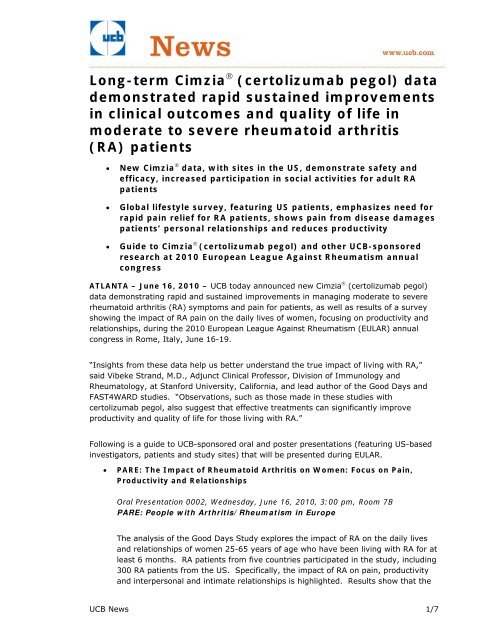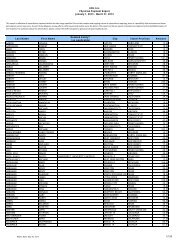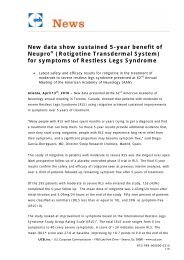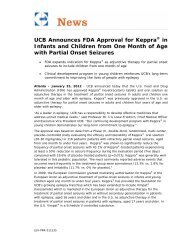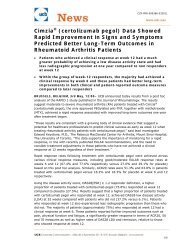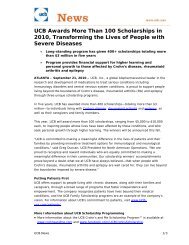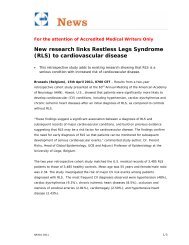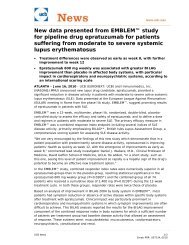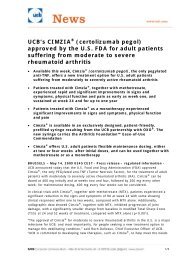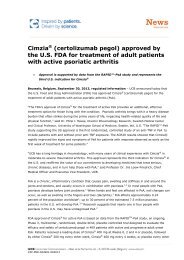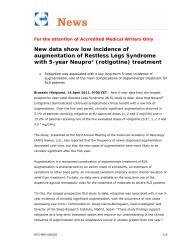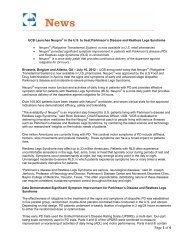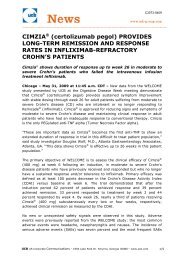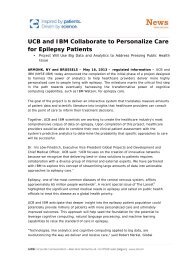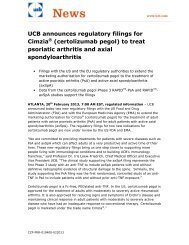Long-term Cimzia® (certolizumab pegol) data demonstrated ... - UCB
Long-term Cimzia® (certolizumab pegol) data demonstrated ... - UCB
Long-term Cimzia® (certolizumab pegol) data demonstrated ... - UCB
Create successful ePaper yourself
Turn your PDF publications into a flip-book with our unique Google optimized e-Paper software.
<strong>Long</strong>-<strong>term</strong> Cimzia ® (<strong>certolizumab</strong> <strong>pegol</strong>) <strong>data</strong><br />
<strong>demonstrated</strong> rapid sustained improvements<br />
in clinical outcomes and quality of life in<br />
moderate to severe rheumatoid arthritis<br />
(RA) patients<br />
• New Cimzia ® <strong>data</strong>, with sites in the US, demonstrate safety and<br />
efficacy, increased participation in social activities for adult RA<br />
patients<br />
• Global lifestyle survey, featuring US patients, emphasizes need for<br />
rapid pain relief for RA patients, shows pain from disease damages<br />
patients’ personal relationships and reduces productivity<br />
• Guide to Cimzia ® (<strong>certolizumab</strong> <strong>pegol</strong>) and other <strong>UCB</strong>-sponsored<br />
research at 2010 European League Against Rheumatism annual<br />
congress<br />
ATLANTA – June 16, 2010 – <strong>UCB</strong> today announced new Cimzia ® (<strong>certolizumab</strong> <strong>pegol</strong>)<br />
<strong>data</strong> demonstrating rapid and sustained improvements in managing moderate to severe<br />
rheumatoid arthritis (RA) symptoms and pain for patients, as well as results of a survey<br />
showing the impact of RA pain on the daily lives of women, focusing on productivity and<br />
relationships, during the 2010 European League Against Rheumatism (EULAR) annual<br />
congress in Rome, Italy, June 16-19.<br />
“Insights from these <strong>data</strong> help us better understand the true impact of living with RA,”<br />
said Vibeke Strand, M.D., Adjunct Clinical Professor, Division of Immunology and<br />
Rheumatology, at Stanford University, California, and lead author of the Good Days and<br />
FAST4WARD studies. “Observations, such as those made in these studies with<br />
<strong>certolizumab</strong> <strong>pegol</strong>, also suggest that effective treatments can significantly improve<br />
productivity and quality of life for those living with RA.”<br />
Following is a guide to <strong>UCB</strong>-sponsored oral and poster presentations (featuring US-based<br />
investigators, patients and study sites) that will be presented during EULAR.<br />
• PARE: The Impact of Rheumatoid Arthritis on Women: Focus on Pain,<br />
Productivity and Relationships<br />
Oral Presentation 0002, Wednesday, June 16, 2010, 3:00 pm, Room 7B<br />
PARE: People with Arthritis/Rheumatism in Europe<br />
The analysis of the Good Days Study explores the impact of RA on the daily lives<br />
and relationships of women 25-65 years of age who have been living with RA for at<br />
least 6 months. RA patients from five countries participated in the study, including<br />
300 RA patients from the US. Specifically, the impact of RA on pain, productivity<br />
and interpersonal and intimate relationships is highlighted. Results show that the<br />
<strong>UCB</strong> News 1/7
pain associated with the disease drives nearly 70 percent of patients to seek<br />
different treatment options. In all countries evaluated, respondents indicated that<br />
RA had a negative impact on productivity at work, as well as interpersonal and<br />
intimate relationships. For full study information, please see: https://b-com.mcigroup.com/AbstractList/EULAR10.aspx<br />
• Efficacy and Safety of Certolizumab Pegol Plus Methotrexate in Patients<br />
with Rheumatoid Arthritis: 3-year Data from the RAPID 2 Study<br />
Poster SAT0127, Saturday, June 19, 2010, 10:15 am, Fiera Roma Poster Area in<br />
Hall 6<br />
Rapid improvements in ACR20, physical function, pain and fatigue of RA as early as<br />
Week 1 were found following treatment with <strong>certolizumab</strong> <strong>pegol</strong>, together with<br />
methotrexate, and was sustained up to 148 weeks. Inhibition of progression of<br />
structural joint damage (seen at Week 24) was sustained up to the last x-ray<br />
evaluation at 2.5 years. Efficacy was measured by ACR 20/50/70 responder rates<br />
and DAS28[ESR]. Patient-reported outcomes included physical function (assessed<br />
using the Health Assessment Questionnaire-Disability Index [HAQ-DI]) and pain<br />
(assessed on a 0–100-mm visual analogue scale [VAS]). For full study<br />
information, please see: https://b-com.mci-group.com/AbstractList/EULAR10.aspx<br />
• Certolizumab Pegol Monotherapy Provides Sustained Improvements in<br />
Household Productivity and Daily Activities in Patients with Active<br />
Rheumatoid Arthritis Over 2 Years<br />
Poster SAT0517, Saturday, June 19, 2010, 10:15 am, Fiera Roma Poster Area in<br />
Hall 5<br />
The analysis of the open-label extension FAST4WARD study <strong>demonstrated</strong> that<br />
patients receiving <strong>certolizumab</strong> <strong>pegol</strong> 400 mg monotherapy reported a rapid<br />
improvement in productivity within the home. In as early as 4 weeks, patients<br />
reported a lower rate of RA interference with household productivity and increased<br />
participation in family, social and leisure activities. The Work Productivity Survey<br />
(WPS-RA), which features <strong>data</strong> from US respondents, was used in the study to<br />
evaluate a variety of measures, including household productivity, as well as the<br />
number of missed days of family, social and leisure activities. For full study<br />
information, please see: https://b-com.mci-group.com/AbstractList/EULAR10.aspx<br />
About Rheumatoid Arthritis<br />
RA affects more than 1.3 million Americans, and it is estimated that 5 million people suffer<br />
from RA globally. Prevalence is not split evenly between genders, since women are three<br />
times more likely to be affected than men. Although RA can affect people of all ages, the<br />
onset of the disease usually occurs between 35-55 years of age.<br />
<strong>UCB</strong> News 2/7
About Cimzia<br />
Certolizumab <strong>pegol</strong> is the only PEGylated anti-TNF (Tumor Necrosis Factor). It has a high<br />
affinity for human TNF-alpha, selectively neutralizing the pathophysiological effects of<br />
TNF-alpha. Over the past decade, TNF-alpha has emerged as a major target of basic<br />
research and clinical investigation. This cytokine plays a key role in mediating<br />
pathological inflammation, and excess TNF-alpha production has been directly implicated<br />
in a wide variety of diseases. The U.S. Food and Drug Administration (FDA) has approved<br />
<strong>certolizumab</strong> <strong>pegol</strong> for reducing signs and symptoms of Crohn's Disease and maintaining<br />
clinical response in adult patients with moderate to severe active disease who have had an<br />
inadequate response to conventional therapy. It is also approved for the treatment of<br />
adults with moderately to severely active rheumatoid arthritis. Certolizumab <strong>pegol</strong> was<br />
approved in Switzerland for induction of a clinical response and for the maintenance of a<br />
clinical response and remission in patients with active Crohn’s Disease who have not<br />
responded adequately to conventional treatment in September 2007.<br />
Please visit www.cimzia.com for full prescribing information for CIMZIA ® .<br />
IMPORTANT SAFETY INFORMATION<br />
Risk of Serious Infections and Malignancy<br />
Patients treated with <strong>certolizumab</strong> <strong>pegol</strong> are at an increased risk for developing<br />
serious infections that may lead to hospitalization or death. Most patients who<br />
developed these infections were taking concomitant immunosuppressants such<br />
as methotrexate or corticosteroids. Certolizumab Pegol should be discontinued if<br />
a patient develops a serious infection or sepsis. Reported infections include:<br />
• Active tuberculosis, including reactivation of latent tuberculosis. Patients<br />
with tuberculosis have frequently presented with disseminated or<br />
extrapulmonary disease. Patients should be tested for latent tuberculosis<br />
before <strong>certolizumab</strong> <strong>pegol</strong> use and during therapy. Treatment for latent<br />
infection should be initiated prior to <strong>certolizumab</strong> <strong>pegol</strong> use.<br />
• Invasive fungal infections, including histoplasmosis, coccidioidomycosis,<br />
candidiasis, aspergillosis, blastomycosis, and pneumocystosis. Patients with<br />
histoplasmosis or other invasive fungal infections may present with<br />
disseminated, rather than localized disease. Antigen and antibody testing for<br />
histoplasmosis may be negative in some patients with active infection.<br />
Empiric anti-fungal therapy should be considered in patients at risk for<br />
invasive fungal infections who develop severe systemic illness.<br />
• Bacterial, viral and other infections due to opportunistic pathogens.<br />
The risks and benefits of treatment with <strong>certolizumab</strong> <strong>pegol</strong> should be carefully<br />
considered prior to initiating therapy in patients with chronic or recurrent<br />
infection. Patients should be closely monitored for the development of signs and<br />
symptoms of infection during and after treatment with <strong>certolizumab</strong> <strong>pegol</strong>,<br />
including the possible development of tuberculosis in patients who tested<br />
negative for latent tuberculosis infection prior to initiating therapy.<br />
<strong>UCB</strong> News 3/7
Lymphoma and other malignancies, some fatal, have been reported in children<br />
and adolescent patients treated with TNF blockers, of which <strong>certolizumab</strong> <strong>pegol</strong><br />
is a member. Certolizumab <strong>pegol</strong> is not indicated for use in pediatric patients.<br />
Serious and sometimes fatal infection due to bacterial, mycobacterial, invasive fungal,<br />
viral or other opportunistic pathogens has been reported in patients receiving TNFblocking<br />
agents. Among opportunistic infections, tuberculosis, histoplasmosis,<br />
aspergillosis, candidiasis, coccidioidomycosis, listeriosis, and pneumocystosis were the<br />
most common. Treatment with <strong>certolizumab</strong> <strong>pegol</strong> should not be initiated in patients with<br />
an active infection, including clinically important localized infections. Certolizumab <strong>pegol</strong><br />
should be discontinued if a patient develops a serious infection or sepsis. Patients who<br />
develop a new infection during treatment with <strong>certolizumab</strong> <strong>pegol</strong> should be closely<br />
monitored, undergo a prompt and complete diagnostic workup appropriate for<br />
immunocompromised patients, and appropriate antimicrobial therapy should be initiated.<br />
Appropriate empiric antifungal therapy should also be considered while a diagnostic<br />
workup is performed for patients who develop a serious systemic illness and reside or<br />
travel in regions where mycoses are endemic.<br />
Malignancies<br />
During controlled and open-labeled portions of <strong>certolizumab</strong> <strong>pegol</strong> studies of Crohn’s<br />
Disease and other diseases, malignancies (excluding non-melanoma skin cancer) were<br />
observed at a rate of 0.5 per 100 patient-years among 4,650 <strong>certolizumab</strong> <strong>pegol</strong>-treated<br />
patients versus a rate of 0.6 per 100 patient-years among 1,319 placebo-treated patients.<br />
In studies of <strong>certolizumab</strong> <strong>pegol</strong> for Crohn’s Disease and other investigational uses, there<br />
was one case of lymphoma among 2,657 <strong>certolizumab</strong> <strong>pegol</strong>-treated patients and one<br />
case of Hodgkin lymphoma among 1,319 placebo-treated patients. In <strong>certolizumab</strong> <strong>pegol</strong><br />
RA clinical trials (placebo-controlled and open label) a total of three cases of lymphoma<br />
were observed among 2,367 patients. This is approximately 2-fold higher than expected<br />
in the general population. Patients with RA, particularly those with highly active disease,<br />
are at a higher risk for the development of lymphoma. The potential role of TNF blocker<br />
therapy in the development of malignancies is not known.<br />
Malignancies, some fatal, have been reported among children, adolescents, and young<br />
adults who received treatment with TNF-blocking agents (initiation of therapy ≤18 years<br />
of age), of which <strong>certolizumab</strong> <strong>pegol</strong> is a member. Approximately half of the cases were<br />
lymphoma (including Hodgkin’s and non-Hodgkin’s lymphoma), while the other cases<br />
represented a variety of different malignancies and included rare malignancies associated<br />
with immunosuppression and malignancies not usually observed in children and<br />
adolescents. Most of the patients were receiving concomitant immunosuppressants.<br />
Cases of acute and chronic leukemia have been reported with TNF-blocker use. Even in<br />
the absence of TNF-blocker therapy, patients with RA may be at a higher risk<br />
(approximately 2-fold) than the general population for developing leukemia.<br />
Heart Failure<br />
<strong>UCB</strong> News 4/7
Cases of worsening congestive heart failure (CHF) and new onset CHF have been reported<br />
with TNF blockers. Certolizumab <strong>pegol</strong> has not been formally studied in patients with CHF.<br />
Exercise caution when using <strong>certolizumab</strong> <strong>pegol</strong> in patients who have heart failure and<br />
monitor them carefully.<br />
Hypersensitivity<br />
Symptoms compatible with hypersensitivity reactions, including angioedema, dyspnea,<br />
hypotension, rash, serum sickness, and urticaria, have been reported rarely following<br />
<strong>certolizumab</strong> <strong>pegol</strong> administration. If such reactions occur, discontinue further<br />
administration of <strong>certolizumab</strong> <strong>pegol</strong> and institute appropriate therapy.<br />
Hepatitis B Reactivation<br />
Use of TNF blockers, including <strong>certolizumab</strong> <strong>pegol</strong>, may increase the risk of reactivation of<br />
hepatitis B virus (HBV) in patients who are chronic carriers of this virus. Some cases have<br />
been fatal. Evaluate patients at risk for HBV infection for prior evidence of HBV infection<br />
before initiating <strong>certolizumab</strong> <strong>pegol</strong> therapy. Exercise caution in prescribing <strong>certolizumab</strong><br />
<strong>pegol</strong> for patients identified as carriers of HBV, with careful evaluation and monitoring<br />
prior to and during treatment. In patients who develop HBV reactivation, discontinue<br />
<strong>certolizumab</strong> <strong>pegol</strong> and initiate effective anti-viral therapy with appropriate supportive<br />
treatment.<br />
Neurologic Reactions<br />
Use of TNF blockers, including <strong>certolizumab</strong> <strong>pegol</strong>, has been associated with rare cases of<br />
new onset or exacerbation of clinical symptoms and/or radiographic evidence of<br />
demyelinating disease. Rare cases of neurological disorders, including seizure disorder,<br />
optic neuritis, and peripheral neuropathy have been reported in patients treated with<br />
<strong>certolizumab</strong> <strong>pegol</strong>. Exercise caution in considering the use of <strong>certolizumab</strong> <strong>pegol</strong> in<br />
patients with these disorders.<br />
Hematologic Reactions<br />
Rare reports of pancytopenia, including aplastic anemia, have been reported with TNF<br />
blockers. Medically significant cytopenia (e.g., leukopenia, pancytopenia,<br />
thrombocytopenia) has been infrequently reported with <strong>certolizumab</strong> <strong>pegol</strong>. Advise all<br />
patients to seek immediate medical attention if they develop signs and symptoms<br />
suggestive of blood dyscrasias or infection (e.g., persistent fever, bruising, bleeding,<br />
pallor) while on <strong>certolizumab</strong> <strong>pegol</strong>. Consider discontinuation of <strong>certolizumab</strong> <strong>pegol</strong><br />
therapy in patients with confirmed significant hematologic abnormalities.<br />
Drug Interactions<br />
An increased risk of serious infections has been seen in clinical trials of other TNF blocking<br />
agents used in combination with anakinra or abatacept. Formal drug interaction studies<br />
have not been performed with rituximab or natalizumab; however because of the nature<br />
of the adverse events seen with these combinations with TNF blocker therapy, similar<br />
toxicities may also result from the use of <strong>certolizumab</strong> <strong>pegol</strong> in these combinations.<br />
Therefore, the combination of <strong>certolizumab</strong> <strong>pegol</strong> with anakinra, abatacept, rituximab, or<br />
<strong>UCB</strong> News 5/7
natalizumab is not recommended. Interference with certain coagulation assays has been<br />
detected in patients treated with <strong>certolizumab</strong> <strong>pegol</strong>. There is no evidence that<br />
<strong>certolizumab</strong> <strong>pegol</strong> therapy has an effect on in vivo coagulation. Certolizumab <strong>pegol</strong> may<br />
cause erroneously elevated aPTT assay results in patients without coagulation<br />
abnormalities.<br />
Autoimmunity<br />
Treatment with <strong>certolizumab</strong> <strong>pegol</strong> may result in the formation of autoantibodies and,<br />
rarely, in the development of a lupus-like syndrome. Discontinue treatment if symptoms<br />
of lupus-like syndrome develop.<br />
Immunizations<br />
Do not administer live vaccines or attenuated vaccines concurrently with <strong>certolizumab</strong><br />
<strong>pegol</strong>.<br />
Adverse Reactions<br />
In controlled Crohn’s clinical trials, the most common adverse events that occurred in<br />
≥5% of <strong>certolizumab</strong> Pegol patients (n=620) and more frequently than with placebo<br />
(n=614) were upper respiratory infection (20% <strong>certolizumab</strong> <strong>pegol</strong>, 13% placebo), urinary<br />
tract infection (7% <strong>certolizumab</strong> <strong>pegol</strong>, 6% placebo), and arthralgia (6% <strong>certolizumab</strong><br />
<strong>pegol</strong>, 4% placebo). The proportion of patients who discontinued treatment due to<br />
adverse reactions in the controlled clinical studies was 8% for <strong>certolizumab</strong> <strong>pegol</strong> and 7%<br />
for placebo.<br />
In controlled RA clinical trials, the most common adverse events that occurred in ≥ 3% of<br />
patients taking <strong>certolizumab</strong> <strong>pegol</strong> 200 mg every other week with concomitant<br />
methotrexate (n=640) and more frequently than with placebo with concomitant<br />
methotrexate (n=324) were upper respiratory tract infection (6% <strong>certolizumab</strong> <strong>pegol</strong>, 2%<br />
placebo), headache (5% <strong>certolizumab</strong> <strong>pegol</strong>, 4% placebo), hypertension (5% <strong>certolizumab</strong><br />
<strong>pegol</strong>, 2% placebo), nasopharyngitis (5% <strong>certolizumab</strong> <strong>pegol</strong>, 1% placebo), back pain<br />
(4% <strong>certolizumab</strong> <strong>pegol</strong>, 1% placebo), pyrexia (3% <strong>certolizumab</strong> <strong>pegol</strong>, 2% placebo),<br />
pharyngitis (3% <strong>certolizumab</strong> <strong>pegol</strong>, 1% placebo), rash (3% <strong>certolizumab</strong> <strong>pegol</strong>, 1%<br />
placebo), acute bronchitis (3% <strong>certolizumab</strong> <strong>pegol</strong>,1% placebo), fatigue (3% <strong>certolizumab</strong><br />
<strong>pegol</strong>, 1% placebo). Hypertensive adverse reactions were observed more frequently in<br />
patients receiving <strong>certolizumab</strong> <strong>pegol</strong> than in controls. These adverse reactions occurred<br />
more frequently among patients with a baseline history of hypertension and among<br />
patients receiving concomitant corticosteroids and nonsteroidal anti-inflammatory drugs.<br />
Patients receiving <strong>certolizumab</strong> <strong>pegol</strong> 400mg as monotherapy every 4 weeks in RA<br />
controlled clinical trials had similar adverse reactions to those patients receiving<br />
<strong>certolizumab</strong> <strong>pegol</strong> 200mg every other week. The proportion of patients who discontinued<br />
treatment due to adverse reactions in the controlled clinical studies was 5% for<br />
<strong>certolizumab</strong> <strong>pegol</strong> and 2.5% for placebo.<br />
Please see full prescribing information at www.cimzia.com before prescribing.<br />
<strong>UCB</strong> News 6/7
For Further Information:<br />
Bert Kelly, Communications and Public Relations Manager, <strong>UCB</strong><br />
T: 770.970.8491, Bert.Kelly@ucb.com<br />
About <strong>UCB</strong><br />
<strong>UCB</strong>, Brussels, Belgium (www.ucb.com) is a biopharmaceutical company dedicated to the research,<br />
development and commercialization of innovative medicines with a focus on the fields of central<br />
nervous system and immunology disorders. Employing more than 9 000 people in over 40<br />
countries, <strong>UCB</strong> produced revenue of EUR 3.1 billion in 2009. <strong>UCB</strong> is listed on Euronext Brussels<br />
(symbol: <strong>UCB</strong>).<br />
Forward-looking statements<br />
This press release contains forward-looking statements based on current plans, estimates and<br />
beliefs of management. Such statements are subject to risks and uncertainties that may cause<br />
actual results to be materially different from those that may be implied by such forward-looking<br />
statements contained in this press release. Important factors that could result in such differences<br />
include: changes in general economic, business and competitive conditions, effects of future judicial<br />
decisions, changes in regulation, exchange rate fluctuations and hiring and retention of its<br />
employees.<br />
###<br />
<strong>UCB</strong> News 7/7


